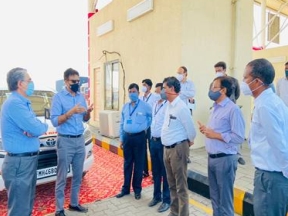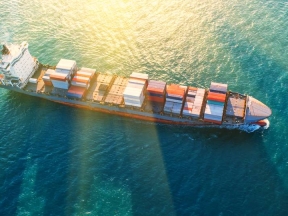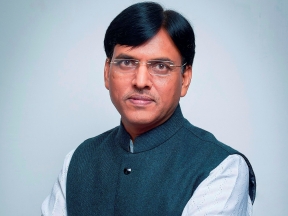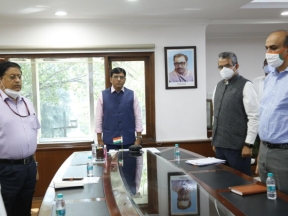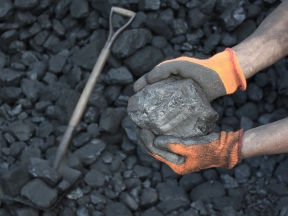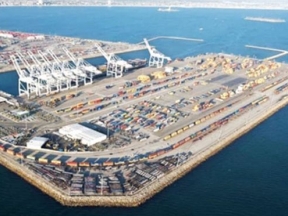In a bid to ensure corruption free industry, CONCOR has partnered with APM Terminals Pipavav for a webinar focused on anti-corruption in logistics industry. Jakob Friis Sorensen, Managing Director, APM Terminals Pipavav said, “This is truly one of a kind initiative where government company has partnered with Public limited company for issues surrounding anti-corruption and other compliances. At APM Terminals Pipavav, an effective compliance programme is a precursor to sustainability as we believe that anti-corruption measures are required to establish global standards and procedures to reduce illegal, unethical and improper conduct to keep industry clean. Compliance is an integral part of our business operation in sync with our parent Maersk Group where compliance is embedded part of culture.” “We are grateful to CONCOR for inviting us for this webinar and allowing us to share our insights and practices,” he adds. Entire management of CONCOR and staff members attended the webinar. The vision of A.P Moller Maersk on anti-corruption and compliance practices was well fathomed by the CONCOR group. A.P Moller Maersk believes in the need for 100% compliance in order to maintain the standard of a global company.
Read More »JNPT centralised parking plaza stands operational
Jawaharlal Nehru Port Trust (JNPT) has opened a new Centralized Parking Plaza (CPP) for container tractor trailers with Customs facilitation, as part of its efforts to promote ease of doing business. The parking plaza spread across 45 hectares has a capacity to park 1,538 tractor trailers at a time. The plaza has been built exclusively to integrate the parking of tractor trailers carrying factory stuffed export containers at one location instead of multiple locations earlier. This will help integrate document processing by Customs with state-of-the art facilities and service provision. The plaza will be managed using Real Time Parking Management system and has a Wi Fi provision within the premises. It has a dormitory for truck drivers to stay, canteen for providing food to truck drivers, well-maintained toilets, area for vehicle repair and maintenance and commercial building. “JNPT is the only port in India which has planned for a facility of this scale and CPP is a key initiative to streamline the traffic movement and improve the port efficiencies using IT services, at the same time provide convenience facilities and amenities at very nominal rates to truck drivers who travel long distances to reach the Port. The Centralized Parking Plaza is an important part of our constant endeavour to provide the ease of doing business within the Port,’’ Sanjay Sethi, IAS, Chairman, JNPT said during a visit to the plaza today along with senior officials to oversee the functioning of the new facility.
Read More »Shipping Ministry issues draft ‘Coastal Shipping Bill, 2020’ for public consultation
Ministry of Shipping has issued the draft of Coastal Shipping Bill, 2020 for suggestions from the stakeholders and general public. As the shipping sector grows and evolves in the country, a need was felt to have a separate legislation on coastal shipping, which considers it an integral part of the transport chain and recognises the policy priorities of the sector to meet the demands of the Indian shipping industry. While drafting this Bill, the global best practices have also been considered. The Ministry of Shipping has drafted a Coastal Shipping Bill, 2020 in lieu of part XIV of the Merchant Shipping Act, 1958. Some of the highlights of the Bill are as under: The definition of coastal shipping and coastal waters has been expanded; It is proposed to do away with the requirement of trading licence for Indian flag vessels for coastal trade; The Bill seeks to create a competitive environment and reduce transportation costs, while encouraging Indian vessels to increase their share in coastal shipping; The Bill also proposes integration of coastal maritime transport with inland waterways; and there is a provision for a National Coastal and Inland Shipping Strategic Plan.
Read More »Bill to promote coastal shipping in parliament soon: Mansukh Mandaviya
Mansukh Mandaviya, Union Minister of State (Independent Charge), says, “A coastal shipping Bill which is expected to be tabled in Parliament will see an increase in the demand for manufacturing of inland vessels. “We are bringing a separate Bill in Parliament in the coming days to promote coastal shipping. So that coastal movement and transportation increases,” informs Mandaviya while speaking at the foundation stone-laying ceremony of the Konkan Maritime Cluster, first such project in the country for building maritime industry-related infrastructure. The Union Minister lamented that India was lagging behind in shipbuilding globally. He also said that his Ministry was geared towards making the shipbuilding sector more competitive in the international market. “Why are we not moving ahead in the shipbuilding sector? First, we are not competitive in the international market; second, there is no domestic demand. How do we increase domestic demand and become more competitive in the international market?” Mandaviya asked, adding that a thrust on coastal shipping will encourage domestic demand. “This will see an increase in the demand for inland vessels and through increase in coastal movement, demand for coastal shipping will also increase,” Mandaviya also said.
Read More »Priority in chartering to be given to Indian built, flagged and owned vessels: Ministry of Shipping
In pursuance of ‘Make in India’ policy of the Government of India, Ministry of Shipping has reviewed the ROFR (Right of First Refusal) licensing conditions for chartering of vessels/Ships through tender process for all types of requirements. In a major boost to shipbuilding in India, the government has amended existing norms and now the first priority in chartering of vessels will be given to ships built and flagged in India as well as owned by Indians, Union Minister Mansukh Mandaviya said. “To boost shipbuilding activities in India, the Ministry of Shipping has amended Right of First Refusal (ROFR) licensing conditions. Now, it has been decided that for any kind of charter of a vessel undertaken through a tender process, the first priority for RoFR would be given to Indian built, Indian flagged and Indian owned vessels,” Shipping Minister Mandaviya. The second priority will be given to foreign built, Indian flagged and Indian-owned vessels while the third priority will be given to Indian built, foreign flagged and foreign-owned ships, he said and termed the policy change a “bold step” in line with Prime Minister Narendra Modi”s vision to promote the domestic industry. “India mostly handles four types of EXIM cargo – crude, gas, coal and fertiliser. Government of India floats tenders for bringing these from foreign. So far Indian flags were given priority in tender irrespective of where the ship is built. Now we have changed that in addition to Indian flag it should be ‘Made in India’. Government PSUs used to give priority to Indian flags till now but now Indian make has also been included,” Mandaviya said. The ministry has already disbursed an amount of Rs 61.05 crore till …
Read More »Ministry of Shipping launches software solution for VTS & VTMS, minimising dependence on foreign support for traffic management
Mansukh Mandaviya, Minister of State for Shipping, Government of India has e-launched the indigenous software solution for Vessel Traffic Services (VTS) and Vessels Traffic Monitoring Systems (VTMS) in the capital. Following the development, Mandaviya emphasises that indigenous system is the requirement of the country instead because there is no need to rely on high costing foreign made software solutions for traffic managements of the Indian Ports. He said that aligning with the vision of ‘Aatma Nirbhar Bharat’ of Prime Minster Narendra Modi, ‘Made in India’ VTS and VTMS software will pave the way for ‘Make for the world’ vessel traffic management systems. VTS and VTMS are software which determines vessel positions, position of other traffic or meteorological hazard warnings and extensive management of traffic within a port or waterway. Vessel Traffic Services (VTS) contribute to safety of life at sea, safety and efficiency of navigation and protection of the marine environment, adjacent shore areas, work sites and offshore installations from possible adverse effects of maritime traffic. Vessels Traffic Management Systems are installed in some of the busiest waters in the world, and are making valuable contribution to safer navigation, more efficient traffic flow, and protection of the environment. Traffic flow in busy approach routes, access channels, and harbours can be coordinated safely, in the best interest of port and its users. Incidents and emergency situations can be dealt with quickly. Data from traffic movements can be stored and used as reference information for port administration, port authorities, coastguards and search and rescue services. VTMS is mandatory under IMO Convention SOLAS (Safety of Life at Sea). The VTMS traffic image is compiled and collected by means of advanced sensors such as …
Read More »Thermal, coking coal imports at major ports saw a drop of 25% to 55 Million Tonnes from April-September: IPA
According to the Indian Ports Association (IPA), thermal coal imports dropped 23.24 per cent to 34.52 million tonnes (MT) during April-September, while coking coal shipments fell 28.04 per cent to 20.89 MT. Coal volumes at the 12 major ports declined for the sixth straight month in September 2020, the association informs. These ports had handled 44.98 MT of thermal coal and 29.03 MT of coking coal in April-September period of the previous financial year. Together, thermal and coking coal handling saw a decline of 25.13 per cent at these ports in the April-September period at 55.41 MT, the IPA, which maintains cargo data handled by these ports, said in its latest report. Thermal coal is the mainstay of India’s energy programme as 70 per cent of power generation is dependent on the dry fuel, while coking coal is used mainly for steel making. India is the third-largest producer of coal after China and the US, and has 299 billion tonnes of resources and 123 billion tonnes of proven reserves, which may last for over 100 years. In the wake of the COVID-19 outbreak, sharp declines were also witnessed in handling of containers, coal and POL (petroleum, oil and lubricant) among other commodities. The 12 ports witnessed considerable decline in cargo traffic, registering a 14 per cent dip in the first half of the current fiscal to 298.55 million tonnes (MT) as against 348.23 MT during April-September of the last fiscal. Mansukh Mandaviya, Shipping Minister last month said cargo traffic at 12 major ports declined considerably March onwards, adversely impacted by the COVID-19 pandemic. India has 12 major ports under the control of the central government — Deendayal (erstwhile Kandla), Mumbai, …
Read More »Ministry of Shipping extends 40% discount on cargo movement between India & Chabahar Port in Iran, for one year
The Union Shipping Ministry has extended the current concessional rate of 40 per cent discount on cargo movement between India and Chabahar Port in Iran for a period of one year. The discount will apply for the coastal movement of cargo and vessel related charges, being handled at Jawaharlal Nehru Port and Deendayal Port to Shahid Beheshti Port, Chabahar. The levy of concessional vessel related charges is to be applied proportionately, subject to vessel loading at least 5,000 tonnes cargo to Shahid Beheshti Port. The ports in coordination with Indian Ports Global Limited will jointly evolve a Standard Operating Procedure (SOP) to ensure that discounts are given to cargo actually discharged or loaded at Shahid Beheshti Terminal of Chabahar Port. According to the Ministry, the aim of the extension of discount period is to promote the trade through Shahid Beheshti Port. It will also give a boost to coastal movement of cargo.
Read More »NLDS extends services to Nepal & Bangladesh; tracks container movement and reduce logistics cost
Utilising its services to improve global logistics, NICDC Logistics Data Services-NLDS (formerly DMICDC Logistics Data Services, DLDS) has extended its services to Nepal and Bangladesh after the consent of Land Port Authority of India (LPAI) to install the RFID readers at Integrated Check Posts (ICPs) at India–Nepal and India–Bangladesh border. With this expansion, exporters and importers from Nepal and Bangladesh can track the movement of their containers through Logistics Databank Portal www.ldb.co.in and a mobile application named ‘NICDC-LDB’. The expansion includes ICPs, namely, Agartala-India-Bangladesh Border, Petrapole-India–Bangladesh border, Jogbani-India–Nepal border, Raxaul-India-Nepal Border With this coverage ICPs located at Agartala, Jogbani and Raxaul will help in road movement container tracking and Petrapole ICP will help in rail movement container tracking. Speaking on the development, K. Sanjay Murthy, IAS, CEO & MD, NICDC (National Industrial Corridor Development Corporation) and Chairman, NLDS says, “The new extension of services reiterates our vision and commitment of streamlining logistics across the country and the brand’s ambition to improve the EXIM trade, reduce the logistics cost and pave the way for India to become a logistics hub.” Ichiro Oshima, CEO, NLDS says, “Since its inception in Dec 2015, NLDS has played a vital role in enhancing the operations of Ports and Maritime Industry in India. While aiming at 100 per cent container volume tracking in India, this expansion will certainly mark a great milestone in bringing efficiency in logistics and supply chain industry.” Before NLDS came into existence, operators handled logistics independently through autonomous systems, which led to delays and inefficient tracking. Through its flagship product, LDB (Logistics Data Bank), NLDS streamlined container movement and today serves 25 port terminals while handling 96 per cent of the country’s …
Read More »IPA joins International Port Community Systems Association to ease trading across borders
The Indian Ports Association (IPA), an apex body of Major Ports under Administrative Control of Ministry of Shipping, Govt. of India, has become the latest member of the International Port Community Systems Association (IPCSA). Dr Abhijit Singh, Executive Director, IPA, states, “Minister of Shipping, Government of India desires Indian Port Community System (PCS1x) should constantly evolve to be the best in class PCS globally. Hence, in order to keep abreast of the technological developments happening globally it is important that IPA should become part of the international port community network by developing noble association with prestigious body like IPCSA. We endeavour to integrate with other international PCS to ease trading across borders. In fact, we wish to align PCS 1x to the 2030 vision of IPCSA.” “IPCSA is delighted to welcome the Indian Ports Association” said Hans Rook, Chairman, IPCSA. He adds, “The IPA brings with it their experience and knowledge on how to develop a National Port Community System. The inclusion of the Indian Ports through PCS1x platform into IPCSA is a new milestone in IPCSAs development and will support in the implementation of new global initiatives.” India is a nation that has been working for many years now on its digital infrastructure and enabling of e-governance. PCS 1x has been rolled out by IPA to offer a true single window for the port and maritime community for sharing data and information. PCS1x has grown in scope and penetration over the last year and a half with significantly better utilisation than its predecessor, which was deployed on premise at major ports in 2006. Since going live in December 2018, the new PCS1x has tripled the user base and reduced …
Read More » Cargo Breaking News
Cargo Breaking News

